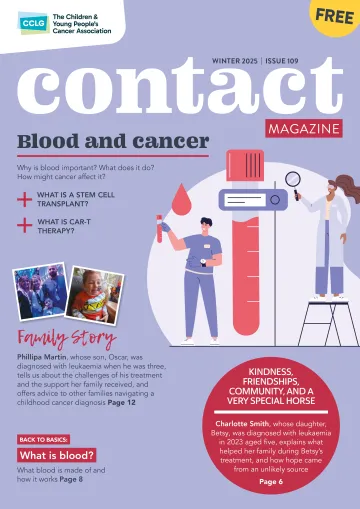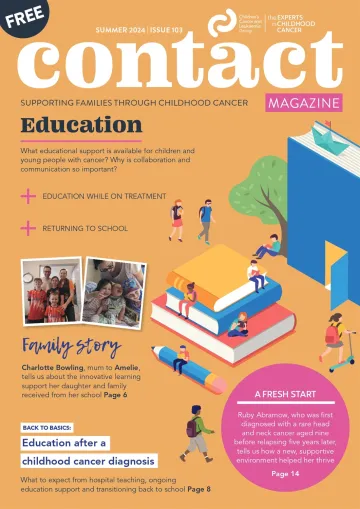In this issue of Contact magazine, all about education, we hear from parents, patients, professionals and teachers about their experiences of education, school and childhood cancer.
Articles from this issue
A parent's view... Facing challenges with the education system
Lauren Bryce’s son, Alfie, had just begun his final year of school when he was diagnosed with leukaemia, aged 15. Here, she tells us about their struggles with the education system after his diagnosis and what could have helped him as he prepared to take his GCSEs.
How robots are being used to support learning
Charlotte Bowling's daughter, Amelie, was diagnosed with acute lymphoblastic leukaemia (ALL) in June 2019 aged six. Charlotte tells us about the support her daughter and her family received from her school, including an innovative way of ensuring Amelie was involved even when not physically present.
60 seconds with Gail Beaumont
Gail Beaumont, a dedicated hospital teacher at Sheffield Children’s Hospital, shares insights into her unique role in providing education and support to young patients during their hospital stays.
How schools can adapt to flexible learning
Sophie Barclay was 15 when diagnosed with a brain tumour, making schooling and exams difficult. Now 18, she tells us how, with the support of her school, she has received a conditional offer for university.
"Moving schools turned out to be a great decision"
Ruby Abramow was first diagnosed with a rare head and neck cancer aged nine, before relapsing in 2019, when she was 14. Now 19, she tells us how a new, supportive environment gave her the fresh start she needed to take back control of her disrupted education.
Ask the Expert: Emily Varley
Emily Varley, a school special educational needs and disabilities coordinator (SENDCo) based in Leicestershire
Medical advisor (issue 103)
Dr. Ren Manias, Consultant Paediatric Oncologist at Southampton General Hospital, explains that while a cancer diagnosis impacts a child's learning, various support options—including hospital schools, home tutoring, and remote learning—are available to help maintain educational continuity and emotional wellbeing during and after treatment.
Education after a childhood cancer diagnosis
Parents and carers of children who have been diagnosed with cancer often have many questions about school and education. Keeley McEvoy, Lead Assistant Headteacher of the Medical Needs Teaching Service working at Leeds Children’s Hospital, explains more about what to expect from hospital teaching, ongoing education support and transitioning back to school.
Educational support pathway after brain tumour treatment
Louise Robinson is a neuro-oncology outreach nurse specialist at East Midlands Children’s and Young Persons’ Integrated Cancer Service. Here, she emphasises the importance of collaboration and explains how a support pathway helps young patients with their education.
Delivering packaged drugs into paediatric brain tumours using ultrasound
Diffuse midline glioma is a devastating brain tumour, affecting primarily young children. There’s currently no cure for this disease and treatment options are limited. This is mainly because this type of tumour is well-protected from drugs by the ‘blood-brain barrier’. This barrier physically blocks all medications from entering the brain. Our group has developed new methods of bypassing this barrier using focused ultrasound.
Why working together is so important
Naomi Duxbury’s daughter, Mia, was aged four when diagnosed with B-cell acute lymphoblastic leukaemia in September 2021. Here, she tells us about the importance of working closely with Mia’s school to create a safe, supportive and ‘normal’ learning environment for her.
"The first day back at school was scary, but exciting"
Lily Morris was diagnosed with acute lymphoblastic leukaemia (ALL) in 2022 aged 15. Now 16, she tells us about its impact on her GCSE preparations, and the support she’s received from her school and friends as she transitioned back into full-time education.
Helping children understand hair loss through the power of storytelling
Penelope Hart-Spencer, Health Play Specialist at The Christie Hospital, tells us about the development of ‘Anna loses her hair’. The award-winning CCLG publication helps educate children on hair loss during cancer treatment.
Ask the expert: What do I need to know about my child returning to school after a cancer diagnosis?
Going back to school can be scary for both you and your child, but it’s important for their mental wellbeing. It helps them to feel ‘normal’ and lessens the isolation and loneliness which many children with cancer face. It gives structure to their day, a focus on the future and is where they can learn and develop social skills and make friends.
School and education: What to expect after a cancer diagnosis
Parents of children who have been diagnosed with cancer often have many questions surrounding schooling and education. Lucy Gwynne, Neuro-Oncology Lead Cancer Nurse Specialist at Birmingham Children’s Hospital, explains more about what to expect.
How one surgeon combines colour and creativity for professional purposes
Mr Robert Wheeler, Consultant Neonatal & Paediatric Surgeon at Southampton Children’s Hospital whose main interest is children’s cancer surgery, tells us how his passion for watercolour painting helps educate and inform families about procedures.
Balancing wellbeing and education while on treatment
Kerry Brown, mum to Felix who was diagnosed with acute lymphoblastic leukaemia (ALL) in 2016, explains how her family navigated the challenges of Felix’s education during treatment
Making the most of educational opportunities: talking with families and professionals
Research project: Access to and experience of education for children and adolescents with cancer: a scoping review consultation exercise
Working with schools to provide a structured education pathway for young brain tumour patients
Louise Robinson, Neuro-Oncology Outreach Nurse Specialist at East Midlands Children’s and Young Persons’ Integrated Cancer Service, tells us about educational support for young brain tumour patients.
A parent's view...
Leukaemia, lockdown and learning… Vicky Newman, whose daughter Alexandra has leukaemia, writes on how lockdown actually helped to reduce gaps in Alex’s education and the isolation she had felt previously when away from school.
Pushing yourself to go is very important but knowing your personal limits is just as vital
Sophie Angell, 15, was diagnosed with acute lymphoblastic leukaemia (ALL) in November 2018. She tells us about her return to school, what she’s learned from her experiences and offers some advice to others.
60 seconds with Harry Hawcroft
The specialist learning mentor for the Medical Needs Teaching Service (MNTS) at Leeds Children’s Hospital (LCH), talks to us about his role supporting young cancer patients
Medical adviser (issue 91, education)
Senior Academic Consultant at University of York, Consultant Paediatric Oncologist at Leeds Children’s Hospital and CCLG member
By working together, we found our own path
Here, a teacher shares their experience of having a child with cancer in their school and how they’ve created a safe, supportive and, importantly, ‘normal’ environment for them.

Subscribe to our free quarterly magazine for families of children and young people with cancer
Subscribe to receive our latest quarterly Contact Magazine.


